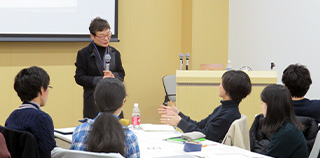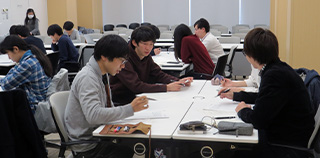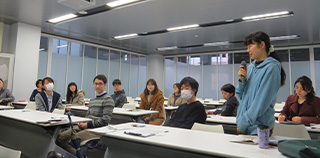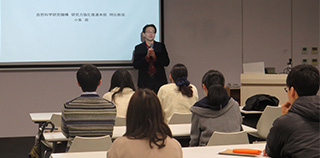Curriculum Outline
The curriculum that helps students acquire the "power to overcome" the boundaries of conventional disciplines and the "power to connect" different disciplines

1. Curriculum for developing the foundational strengths
The curriculum cultivates a high degree of expertise in carrying high-quality, cutting-edge research and a broad range of knowledge for launching into different fields of study.
- GTR Fundamental Course Ⅰ
- The course consists of six units: material transformation and functions, advanced nano-measurements, chem-bio/drug discovery, systems biology, neuroscience, and biomass/breeding.
- GTR Fundamental Course Ⅱ
- The course offers seminars for acquiring skills and knowledge in areas such as intellectual properties, writing, presentation, and research integrity in collaboration with the Nagoya University Organization for the Promotion of Leading Graduate Schools.
- GTR Next-Generation Lectures
- The program also offers lectures on practical skills and knowledge in areas such as informatics and imaging techniques, which should be acquired in next-generation PhD courses.

Seminars for acquisition of skills

2. Course for cultivating comprehensive research power
The course cultivates foresight, the power of independent thought, research creativity, the power to develop personal connections and human networks, an international perspective, and a willingness to take on new challenges.
The course includes:
- A series of lectures on thinking about multidisciplinary problems
- A series of lectures on industrial perspectives
- A proposal for independent research (Qualifying Examination)
- A contest for interdisciplinary research proposals
- Offsite training
- A leadership training program for women
- An English study course for developing debating skills

Leadership training program for women

3. Program for developing research power to achieve breakthroughs
The program cultivates research power to achieve breakthroughs, which is the power to easily cross the boundaries of conventional disciplines and advance interdisciplinary frontiers.
- Interdisciplinary frontiers research
- Under the mixed-lab concept, students receiving instruction from two mentors carry out their research in an interdisciplinary research environment (multiple laboratories), including foreign collaborating institutions and companies.
Examples of interdisciplinary frontiers research
- Interdisciplinary research pursued by moving into a different laboratory for a year
- Interdisciplinary research carried out in a mixed lab under the instruction of multiple mentors with different areas of expertise
- Interdisciplinary research pursued by simultaneously enrolling in two laboratories
- Interdisciplinary research pursued through collaborations with foreign research groups and companies



Cultivating researchers to advance interdisciplinary frontiers through the 5-year integrated program
Requirements for completing the GTR
- A thesis based on interdisciplinary frontiers research
- Interdisciplinary research conducted by enrolling in multiple laboratories
- Passing two qualifying exams (QE)
- Earning credits and points required in the curriculum for development of foundational strengths
Students are assessed in terms of the process of working toward their interdisciplinary research and the quality of their final research findings.
Requirements for completing the GTR curriculum
- Lectures open to students of other disciplines: 2 credits
- Next-generation lectures: 1 course
- Lecture series on multidisciplinary problems: 8 points
- Seminars for acquisition of skills: 8 points

